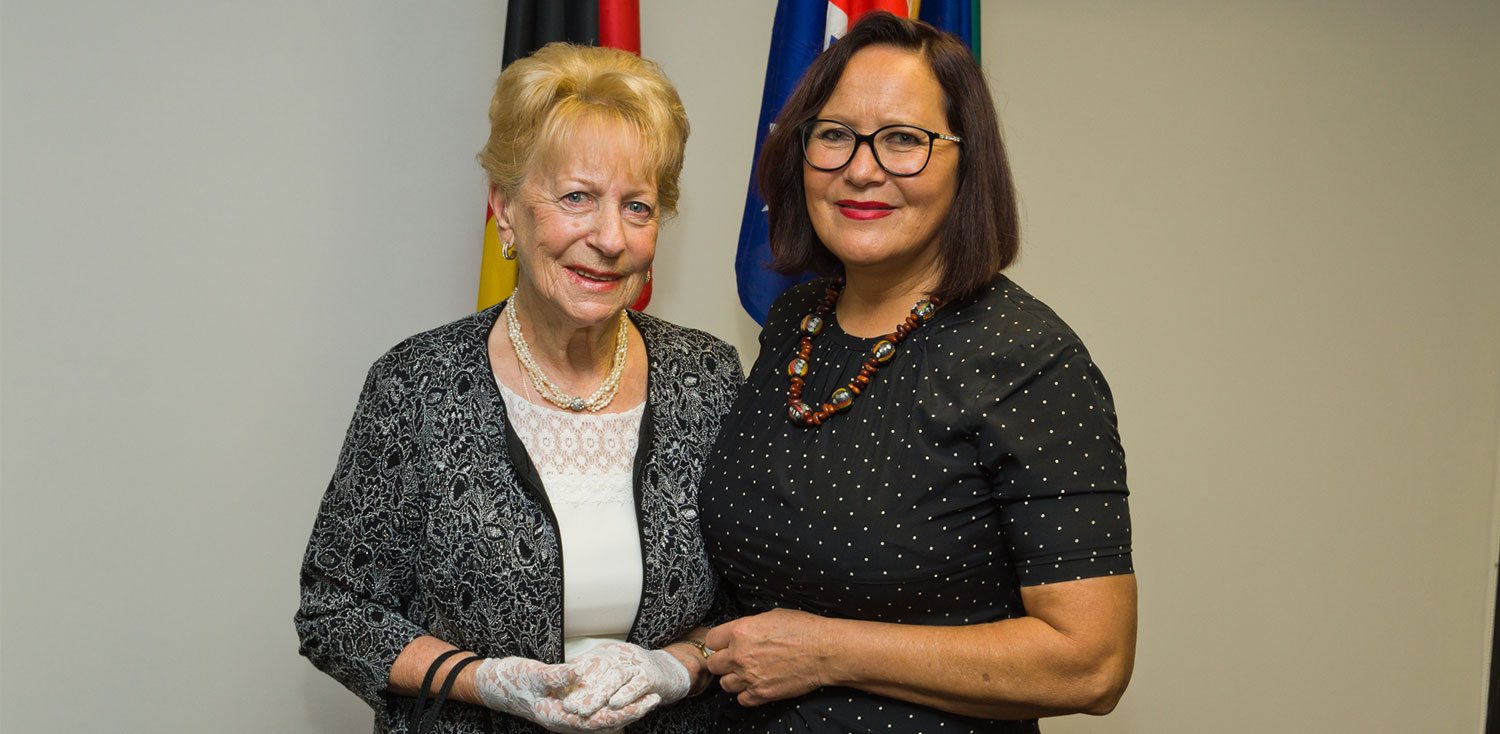Photo: Dr Donna Odegaard and her mother, Edith LeFrancois Bessen.
Dr Donna Odegaard AM was silenced as a child but has since dedicated her life to ensuring the voices of Indigenous Australians don’t suffer the same fate.
Story by Tracey Porter.
Dr Donna Odegaard is an unlikely business leader.
Birthed into a large but impoverished family in 1953, her early years in the outback were spent living in a tent before the consequences of the hardship the family endured saw her torn from the familial bosom and placed in an institution, thousands of kilometres away.
Despite her humble beginnings, Dr Odegaard has risen to become one of Darwin’s most respected business women with interests across everything from fashion and interior design to primary production and property development.
Yet it is her work with the Indigenous community – rather than her commercial acumen – that continues to afford her the greatest satisfaction.
And it is inspiring leaders such as Dr Odegaard who have contributed to the celebration of the role women play in the community.
Having dedicated the past three decades to increasing Indigenous opportunities across a broad spectrum of sectors including native title, media, education, training and employment, Dr Odegaard is an Indigenous Alumni Award winner, an Australian of the Year nominee and a Member in the General Division of the Order of Australia for significant service to Indigenous cultural heritage.
The woman her grandchildren fondly refer to as “Mimi” possesses a Masters in Law and Aboriginal Land Claims and also holds a PhD on Treaty – a background which saw her play an instrumental role in securing the Larrakia Kenbi Land Claim.
A twice-published author, the respected Larrakia elder is the founder and CEO of Aboriginal Broadcasting Australia but also sits on numerous business and community boards including the Indigenous Land Corporation, the Indigenous Business Trans-Tasman Delegation and the government driven Indigenous Reference Group Developing the North, headed by federal minister Matt Canavan.
When pushed to define the driver for her success, Dr Odegaard credits her austere upbringing with offering her a perspective not normally enjoyed by others in leadership positions.
“For me it was about being in survival mode. It was tough juggling motherhood, rent, sewing but I worked hard. I had to… but what that has given me is a great appreciation of, and priority for, family and hard work. I’m more concerned about what I can do than what I can’t, what I have than what I don’t.”
Aged under two when she was sent to the girl’s home and seven when she was released, Dr Odegaard says despite the fact some of her sisters were also present, at the time she felt forced to build her own support network.
“No one tells you what a family is. It was a difficult time particularly for my parents. I had a black man who would visit me and cry and I didn’t know who he was. Then I had my mother who was trying to remain close to all four of her daughters until such time as she could take us all out. But because I was institutionalised, I became a very good listener because that’s how I was groomed, I couldn’t speak and had to remain silent.”
In 1970 Donna, by then a 17-year-old mother-of-one, found history repeating when she found herself alone once again following her husband’s conscription into the Vietnam War. Deprived of income, the teenager was forced to think on her feet in order to provide for herself and her child.
In possession of little else but an extraordinary amount of determination and an old sewing machine – given to her by her mother who through necessity had provided everything from bedding to food for her family – Donna set about sewing, making clothes for her baby and the extended family.
Within 12 months her remit extended to making collections of children’s clothes to sell to her local community for a small profit. It was the start of a career for the enterprising young mother that would help her and her family endure for at least the next 25 years.
“It was a valuable lesson, to perfect a craft to ensure that if I identified a need I could actually have a better quality of life for myself and my babies,” she says.
Dr Odegaard says her experiences have equipped her with many skills useful in her day-to-day role managing others – not least of which is the ability to observe, to listen and to do things with what she terms “a good heart”.
Motivated by a sense of obligation to honour the efforts of her mother, her daughter, her sisters and the countless other women who have assisted on her journey, Dr Odegaard says she is neither a ruthless leader nor a walkover.
Instead her approach is one based on mutual respect.
“In terms of my legacy, I want my children to be proud of who I am and what I do. I have learnt that you have do right by yourself first, your family, community and society to get what you want. You need to be able to build your staff and encourage those with whom you come into contact with to be the best that they can without judgement.
“I think you have to instil a sense of hope, to let them know that ‘it doesn’t matter what you don’t know, it’s what you’re willing to learn’. Be persistent and keep going until you find out what it is you want to do. Be a leader and a role model and things will come your way – expect hard work and it will happen.”


